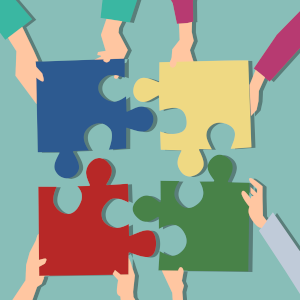Speed puzzling partners can be a dynamic and engaging relationship that offers you a chance to better your skills and have fun. You might be wondering, will this work? A speed puzzling partner is another take on how the puzzle competition can activity, fostering collaboration and teamwork.

I remember my speed puzzling partners. I’ve had four people who were a partner at one time or another, but then there was Renee. We were paired up by accident (literally). Her partner had an emergency and didn’t come. My partner got nervous and decided on bailing. At that moment we were two people who knew what a speed puzzling partner could do, if, they worked together.
We played together for several years. Loved every minute of it too. Probably my favorite speed puzzling partner ever! Plus, I learned so much from her (and even a few weird tips too). Not only did I learn things from her, I demanded better speed puzzling skills for myself. Leaving us reaching for the pieces!
Table of Contents
Speed Puzzling Partner Tips to Remember
Looking back I realized that the engaging part of the speed puzzling partner was pushing each other. We worked hard making each other better and a flowering friendship started in the moment. So how can you have a speed puzzle partner that you can depend on? You need to try engaging with speed puzzle practice by sharing with others. You will know when you click! And it will feel great! On the same token, if it’s not someone that fits your style, tempo or the like, you will know that too. I’ve had speed puzzling partners that are nice people, but didn’t quite match right. And you know what? I know they felt the same way
Well, here are five essential things to know when engaging in speed puzzling with a partner:
1. Communication is Key.
Effective communication is crucial when working with a partner on a speed puzzling challenge. Clearly convey your thoughts, observations, and intentions to ensure seamless communication and collaboration. Discuss strategies, share insights, and establish a system for coordinating efforts.
2. Division of Roles is a Must!
Divide the puzzle into sections and assign roles to each partner. Specializing in specific sections can enhance efficiency, with one person focusing on edges while the other tackles interior pieces, for example. Regularly communicate about progress to maintain synchronization. The key is knowing and implementing your role fast, without being told.
3. Coordination and Harmony is Priority.
Establish a rhythm and flow that complements your speed puzzling partners style. Harmonizing movements and decision-making processes will minimize disruptions and create a more fluid puzzle-solving experience. Adapt to your partner’s pace and find a mutual cadence that maximizes efficiency.
4. Utilize Each Other’s Strengths and Weaknesses.
Identify and leverage each other’s strengths. If one partner excels at pattern recognition, while the other is skilled at fine details, allocate tasks accordingly. Combining individual strengths enhances the overall effectiveness of the team.
5. Practice Together and Find a Familiarity.
Regularly practice speed puzzling with your partner to build familiarity and refine collaborative strategies. Understanding each other’s approaches, preferences, and tendencies will lead to smoother and more successful puzzle-solving sessions. Consistent practice enhances coordination and elevates the overall performance of the team.
Come Together as a Team for a Win
A speed puzzling partner not only adds an extra layer of enjoyment to the activity but also offers an opportunity to learn from each other, refine problem-solving strategies, and celebrate shared accomplishments. You will find that a speed puzzling teams uses some of these very simple. You will find that school groups even use these tips! Embrace the unique dynamics of working with a partner and enjoy the journey of conquering puzzles together.
I think of it as twice the chance to win! And I had an amazing puzzle competition experience in the process. I still remember the high-fives as we finished our best time. No, we did not win, but then again it felt so good!
